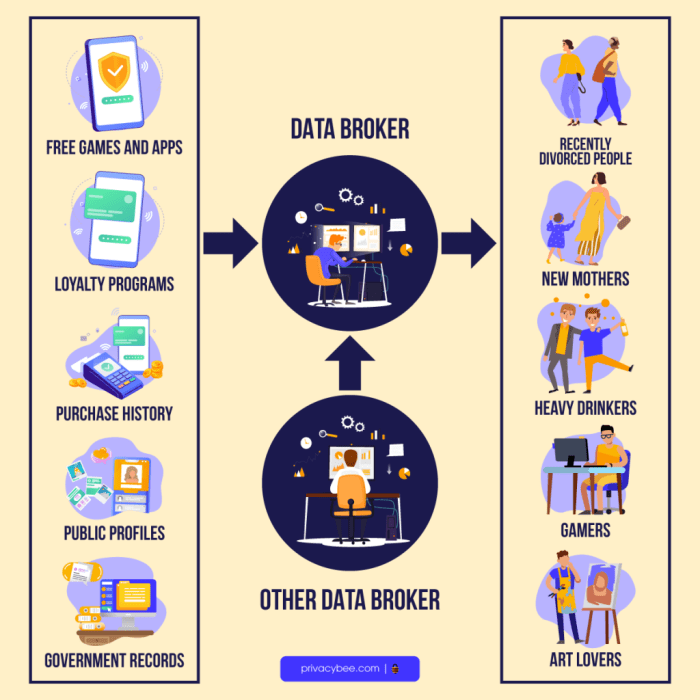We need to break big techs data broker industry – We Need to Break Big Tech’s Data Broker Industry. It’s time to talk about the hidden world of data brokers, those companies quietly collecting and selling our personal information without our knowledge or consent. From browsing histories to location data, these companies are building detailed profiles of us, impacting everything from the ads we see to the loans we qualify for.
The rise of big tech data brokers has created a complex and concerning landscape. While these companies claim to provide valuable insights and targeted services, the ethical implications of their practices are undeniable. The potential for privacy violations, discrimination, and manipulation is a serious threat to individual freedom and a healthy society.
The Rise of Big Tech Data Brokers
The rise of Big Tech data brokers is a recent phenomenon, driven by the explosion of data generated by users online. These companies, often operating behind the scenes, collect, analyze, and sell vast amounts of personal information about individuals, shaping how we interact with the digital world.
History of Data Brokering
Data brokering has been around for decades, but its reach and impact have been amplified by the rise of the internet and social media. Early data brokers focused on collecting and selling information from public records, such as phone directories and voter registration lists. However, with the advent of the internet, data brokers gained access to a wealth of new information, including online browsing history, social media activity, and location data.
Business Models of Data Brokers
Data brokers employ various business models to collect and monetize personal data. Some operate as data aggregators, collecting information from multiple sources and then selling it to businesses. Others focus on specific data segments, such as consumer demographics or financial information.
- Revenue Streams: Data brokers generate revenue through various means, including:
- Data Sales: Selling compiled data sets to businesses for marketing, advertising, and research purposes.
- Data Licensing: Providing access to data through subscriptions or licensing agreements.
- Data Analytics Services: Offering data analysis and insights to help businesses make better decisions.
- Data Collection Practices: Data brokers employ a range of techniques to collect data, including:
- Website Tracking: Using cookies and other tracking technologies to monitor user activity on websites.
- Social Media Scraping: Extracting data from social media platforms, including profiles, posts, and interactions.
- Public Records Access: Obtaining information from government databases, such as voter registration lists and property records.
- Data Purchases: Acquiring data from other data brokers or data aggregators.
Ethical Concerns Surrounding Data Brokering
The rise of Big Tech data brokers has raised significant ethical concerns, particularly regarding privacy violations, discrimination, and manipulation.
- Privacy Violations: Data brokers collect vast amounts of personal information, often without explicit consent from individuals. This raises concerns about the potential for misuse of this data, including identity theft, fraud, and unwanted marketing.
- Discrimination: Data brokers often use algorithms to profile individuals based on their data, which can lead to discrimination in areas such as employment, lending, and insurance.
- Manipulation: Data brokers can use personal information to target individuals with tailored advertising and marketing campaigns, which can be manipulative and exploit vulnerabilities.
The Impact of Data Brokering on Individuals and Society
Data brokering, the practice of collecting, analyzing, and selling personal information about individuals, has become a pervasive force in the digital age. While it offers potential benefits, such as targeted advertising and personalized services, it also raises serious concerns about the impact on individual privacy, autonomy, and society as a whole.
The Impact of Data Brokering on Individual Privacy and Autonomy
Data brokering poses a significant threat to individual privacy and autonomy. By aggregating and selling personal data, these companies create detailed profiles of individuals, often without their knowledge or consent. This information can be used for various purposes, including targeted advertising, credit scoring, and even insurance pricing. The potential for misuse and exploitation of this data is vast, as it can be used to manipulate individuals, discriminate against them, or even harm their reputation.
The Impact of Data Brokering on Social Inequalities and Discrimination
Data brokering can exacerbate existing social inequalities and contribute to discrimination. For example, data brokers may use information about an individual’s race, ethnicity, or socioeconomic status to create profiles that are used to deny them access to certain services or opportunities. This can lead to a cycle of disadvantage, where individuals are denied access to resources and opportunities based on their perceived demographic characteristics.
The Impact of Data Brokering on Democracy and Freedom of Speech, We need to break big techs data broker industry
Data brokering can have a detrimental impact on democracy and freedom of speech. By tracking and analyzing online activity, data brokers can create profiles of individuals that reveal their political beliefs, social affiliations, and even their personal relationships. This information can be used to manipulate public opinion, target individuals with disinformation, or even suppress dissenting voices.
Regulatory Frameworks and Policy Responses: We Need To Break Big Techs Data Broker Industry
The burgeoning data broker industry, fueled by the insatiable appetite of Big Tech for personal information, has spurred a global movement to regulate this opaque and often exploitative sector. While the regulatory landscape is still evolving, various countries have taken steps to address the concerns surrounding data brokering.
Comparison of Regulatory Frameworks
Different jurisdictions have adopted diverse approaches to regulate data brokering, reflecting their unique cultural, legal, and technological contexts. Here’s a comparison of existing regulations and policies in different countries:
- The European Union (EU): The EU’s General Data Protection Regulation (GDPR) has been lauded as a landmark in data privacy, granting individuals significant control over their personal data. The GDPR mandates that data brokers obtain explicit consent before collecting and processing personal data, provides individuals with the right to access, rectify, and erase their data, and imposes hefty fines for non-compliance. Furthermore, the GDPR requires data brokers to provide individuals with transparent information about how their data is used.
- California, USA: California’s Consumer Privacy Act (CCPA) is a state-level law that grants similar rights to EU residents, including the right to know, the right to delete, and the right to opt-out of the sale of personal data. The CCPA applies to businesses that collect personal data of California residents, regardless of their location, and imposes stringent requirements on data brokers operating within the state.
- Brazil: Brazil’s General Data Protection Law (LGPD) is another comprehensive data protection law that aims to safeguard personal data and regulate data brokering activities. The LGPD requires data brokers to obtain explicit consent before collecting and processing personal data, provides individuals with the right to access, rectify, and erase their data, and imposes penalties for non-compliance.
- Australia: Australia’s Privacy Act 1988 has been amended to include provisions that regulate data brokering. The Act requires data brokers to comply with the Australian Privacy Principles, which include obligations related to the collection, use, and disclosure of personal data.
Public Awareness and Advocacy
The data broker industry operates in the shadows, collecting and selling our personal information without our knowledge or consent. This practice raises serious concerns about privacy, security, and the potential for misuse of our data. To combat this issue, a multi-pronged approach is needed that involves educating the public, empowering individuals to protect their privacy, and advocating for stronger regulations.
Public Awareness Campaigns
Raising public awareness about the data broker industry is crucial. This can be achieved through various campaigns that inform individuals about the risks associated with data brokering, how their information is being used, and the potential consequences of this practice. Here are some key elements of an effective public awareness campaign:
- Use clear and concise language. Avoid technical jargon and complex terminology. Explain concepts in a way that is easy to understand for the general public.
- Emphasize the real-world implications. Highlight the potential for data misuse, such as identity theft, discrimination, and targeted advertising.
- Use relatable examples. Illustrate the risks of data brokering through real-life scenarios that people can connect with.
- Provide practical tips. Offer actionable advice on how individuals can protect their privacy and limit data collection.
- Leverage social media and online platforms. Reach a wider audience by utilizing popular social media platforms and online channels to spread awareness.
- Partner with influential figures. Collaborate with celebrities, journalists, and other public figures to amplify the message and reach a broader audience.
Individual Privacy Protection Toolkit
Empowering individuals to protect their privacy is essential. A toolkit can provide individuals with practical resources and strategies to limit data collection and protect their personal information. Here are some key components of a privacy protection toolkit:
- Understand your privacy rights. Provide information about data privacy laws and regulations, including the right to access, rectify, and erase personal data.
- Limit data sharing on websites and apps. Explain how to control privacy settings, opt out of data sharing, and use privacy-focused browsers and search engines.
- Use strong passwords and multi-factor authentication. Emphasize the importance of strong passwords and multi-factor authentication to protect online accounts.
- Be cautious of data collection practices. Educate individuals about the various ways data is collected, including cookies, tracking pixels, and location data.
- Use privacy-enhancing tools. Provide information about privacy-enhancing tools, such as VPNs, ad blockers, and privacy-focused search engines.
- Report data breaches and privacy violations. Explain how to report data breaches and privacy violations to relevant authorities.
Advocacy Efforts
Advocating for stronger regulations and ethical data practices is crucial to address the systemic issues associated with data brokering. Here are some key strategies for advocacy efforts:
- Lobby for legislative action. Work with policymakers to introduce and pass legislation that restricts data brokering practices, strengthens privacy protections, and establishes clear guidelines for data collection and use.
- Engage with regulatory bodies. Advocate for stronger enforcement of existing privacy laws and regulations, and push for the creation of new regulations specifically targeting data brokers.
- Raise awareness among consumers. Empower consumers to demand greater transparency and control over their data. Encourage them to contact companies and policymakers to express their concerns.
- Support research and analysis. Fund research projects that investigate the impact of data brokering on individuals and society, and provide evidence-based recommendations for policy changes.
- Promote ethical data practices. Advocate for the adoption of ethical data practices within the technology industry, including principles of transparency, accountability, and consent.
The data broker industry is a ticking time bomb. It’s time to take action. We need to demand transparency, accountability, and stronger regulations. We need to empower individuals with tools to protect their privacy and control their data. It’s not about stopping innovation; it’s about ensuring that technology serves humanity, not the other way around.
We need to break Big Tech’s data broker industry, and the latest move by Amazon is a prime example of why. Amazon now lets sellers create listings through a URL by using AI , which means they’re gathering even more data about our shopping habits and preferences. This data is then used to target us with ads, further fueling the data-driven advertising machine that Big Tech has built.
It’s time to demand more transparency and control over our data, or risk becoming nothing more than a product to be bought and sold.
 Standi Techno News
Standi Techno News

